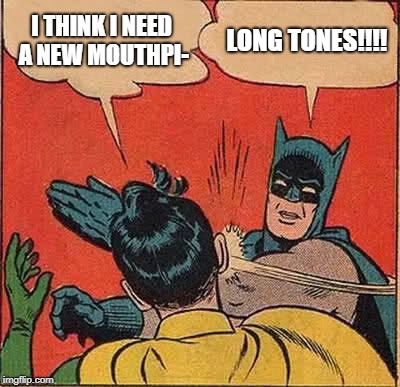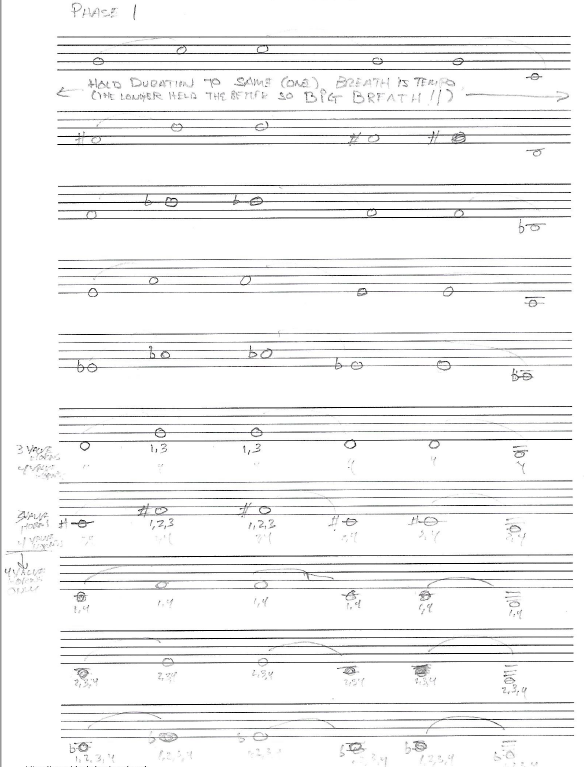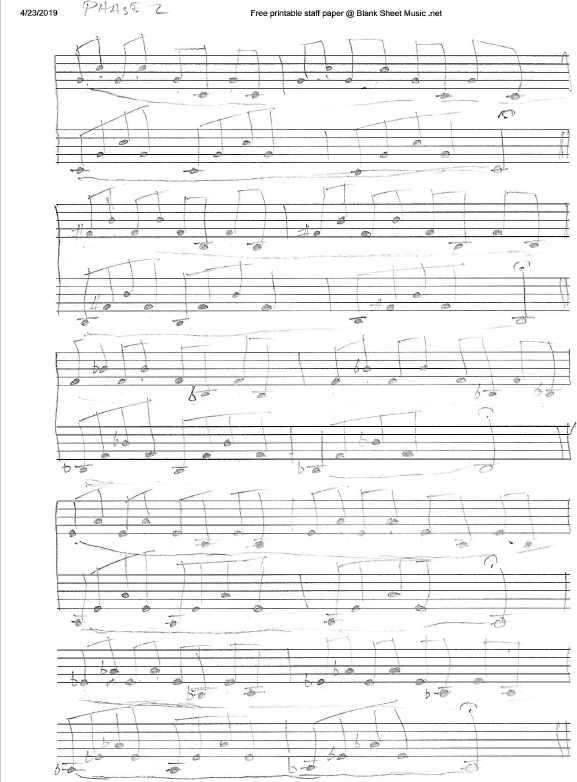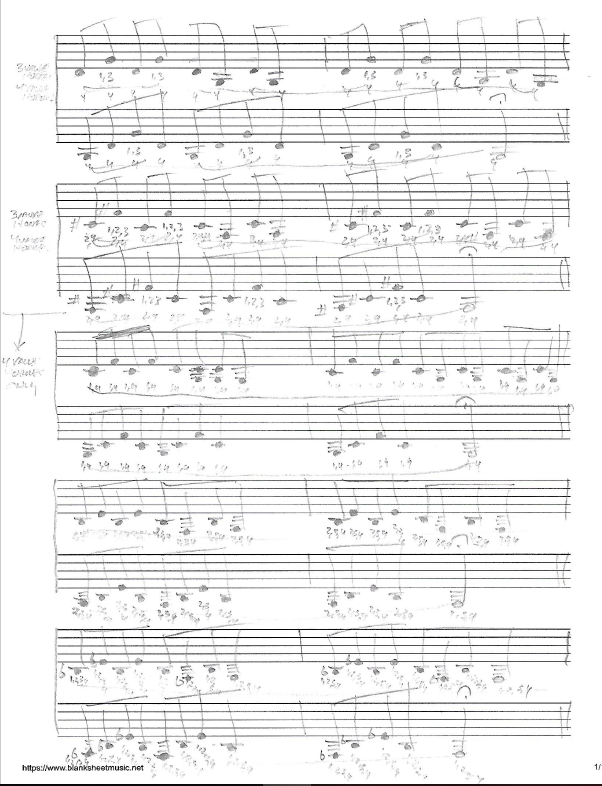LONG TONES
-
There is a discussion going on at the other site on long tones and I thought it would be interesting to see what members here think of them.
In 1953 I studied for 6 months at a conservatory but I was unsatisfied with the professor who taught trumpet. He was nasty and did little to help me. After I left the conservatory I took lessons from a local professional trumpet player who was rated one of the best all-round players in eastern Canada.
The first thing he had me do was play long tones and everything that didn't work at the conservatory now started to work. After a 50 year hiatus playing the trumpet again in my eighties was tough but good old long tones became the backbone of my technical studies, and even today, more than three years later, I work long tones into my morning exercises, and warm up on p-f-p long tones before my afternoon hour of playing tunes. And even after three lip injuries last year, long tones got me back in the saddle. But that's just me. Some say long tones do nothing for them. What about you ? -
Well, I posted over THere and will post here. Longtones are tough, boring, not glamorous, but can make all the difference in the world for a player with endurance and control. It's why my Batslap avatar says "LONGTONES"!!

-
I've never understood why they work for some and not for me. For me, they result in an adaptation to that note range and I lose flexibility. I find scales and arpeggios over multiple octaves much more useful.
-
I think that long tones done correctly can make a big difference, but it takes some real discipline to do them correctly. It's probably the key thing that keeps me from regaining the consistency I had during my technical best on the horn in my early 20s. Back then I took the time to do them and to do them correctly.
Hmmm....might have to try giving it a go the next time I hit the practice room.
Tobylou, unless someone else had the same idea as me, it's quite possible that I created your Batslap avatar.

(EDIT: mine is a touch different than the one you've got.)

-
@Richard-III said in LONG TONES:
I've never understood why they work for some and not for me. For me, they result in an adaptation to that note range and I lose flexibility. I find scales and arpeggios over multiple octaves much more useful.
No doubt about that. Scales and arpeggios are a necessity to me and will always be apart of my technical exercises.
-
My take on long tones: As a trumpet player; As a physician that taught muscle physiology for 27 years at a medical school.
As a trumpet player. I studied for several years under Eugene Blee, the longest running Principle Trumpet player for the Cincinnati Symphony Orchestra. He was the individual that drilled into me the importance of warming up with long tones. He taught me this skill in the 1970's. I still use this today, almost 50 years later. I use his exact routine before I start ANY rehearsal or performance when time is under my control. Why? Because I have been very successful when playing for an audience for these 50 yeaars. The RARE times I have not been able to use his warm up because I have arrived late at a performance, I fatigue early into the performance. So for me, those long tones are essential to get warmed up so to make it through even the most demanding performance.
As a physician teaching muscle physiology. Long tones gets the muscle fibers to align to a performance strength demand while gently providing blood flow to the muscle fibers. That stretch coordination is vital to keep the motor units to function optimally as a group in series that will minimize fatigue. Blood flow is essential, not only to get oxygen into the muscles to allow as much aerobic combustion with optimal ATP production (the bottom line fuel source for muscle [ATP is NOT only the racer's edge... also the Trumpet player's edge]) . THEN there is the exhaust. Once this oxygen burns, phosphate bonds are transferred and consumed, carbon by-products begin to form. The most stress causing carbon by-product is lactic acid. Lactic acid is removed and eliminated by the liver, but you got to get it out of the muscle and delivered to the liver to prevent a back up in the muscle AND for the liver to convert that lactic acid back to glucose to recycle that fuel source BACK to the muscle (This is called the Cori Cycle). That is the second essential component of blood flow, it gets the lactic acid out.
So putting it all together: Long tones improve blood flow to muscle that is being recruited for performance. The blood flow gets oxygen in and toxic by-products as a consequence of this oxygen delivery out. So if we are using long tones EFFECTIVELY this process WILL optimize performance.
-
Warm up: Part 2
So Eugene Blee taught me 2 components of warming up. You just read the Part 1, Long Tone component, Then he taught me Part 2, which immediately follows. So once you have those motor units primed and optimized, it is next important to start the muscle groups functioning in that optimal configuration before that start up muscle memory is lost. So Eugene taught me to work through a chromatic sequence of lip slurs that again is part of my warm up routine. This gets the now optimized muscle fibers to begin to glide in a highly coordinated manner to train the muscle to function now with optimal control.
You know until I became an academic physician, I did not understand the process... it just worked for me. Since by PhD training as a bioinorganic chemist, my MD training as a physician and by trumpet training from Eugene Blee, I now understand the process and the genius behind Eugene. Thanks so much Mr. Blee for giving me this special gift.
-
@trickg said in LONG TONES:
I think that long tones done correctly can make a big difference, but it takes some real discipline to do them correctly. It's probably the key thing that keeps me from regaining the consistency I had during my technical best on the horn in my early 20s. Back then I took the time to do them and to do them correctly.
Hmmm....might have to try giving it a go the next time I hit the practice room.
Tobylou, unless someone else had the same idea as me, it's quite possible that I created your Batslap avatar.

(EDIT: mine is a touch different than the one you've got.)

IDK, I made mine up at a meme generator 9 years ago?? Sentiment is spot on.
-
If they work, use them, if they don't, then don't. But don't use some rationale that they don't work as an excuse for getting out of playing them. A placebo effect, as it were. Don't be lazy or expedient.
When I began playing them, of course they were part of my routine. Later on, I believed they stiffened my lips, so I quit playing them. Instead, I played "moving long tones", like Chicowitz' exercises and Concone.
Jump several decades and several strokes later. I was trying, unsuccessfully, to regain my playing strength. All sorts of exercises only had minimal effect. Then, I read that both Miles and Chet, when asked how they got their chops back, first mention out of the gate was, "long tones". I started playing long tones and, almost immediately, my chops got more consistent and my playing better.
Now, part of this could be a chicken or egg scenario. It could be that all my other work prepared me so that the addition of long tones became effective. But there's no way I would know that, so I have to believe that the long tones, in and of themselves, have a significant effect, at least for someone like me who is trying to build, or rebuild, one's chops.
-
@Dr-GO said in LONG TONES:
My take on long tones: As a trumpet player; As a physician that taught muscle physiology for 27 years at a medical school.
As a trumpet player. I studied for several years under Eugene Blee, the longest running Principle Trumpet player for the Cincinnati Symphony Orchestra. He was the individual that drilled into me the importance of warming up with long tones. He taught me this skill in the 1970's. I still use this today, almost 50 years later. I use his exact routine before I start ANY rehearsal or performance when time is under my control. Why? Because I have been very successful when playing for an audience for these 50 yeaars. The RARE times I have not been able to use his warm up because I have arrived late at a performance, I fatigue early into the performance. So for me, those long tones are essential to get warmed up so to make it through even the most demanding performance.
As a physician teaching muscle physiology. Long tones gets the muscle fibers to align to a performance strength demand while gently providing blood flow to the muscle fibers. That stretch coordination is vital to keep the motor units to function optimally as a group in series that will minimize fatigue. Blood flow is essential, not only to get oxygen into the muscles to allow as much aerobic combustion with optimal ATP production (the bottom line fuel source for muscle [ATP is NOT only the racer's edge... also the Trumpet player's edge]) . THEN there is the exhaust. Once this oxygen burns, phosphate bonds are transferred and consumed, carbon by-products begin to form. The most stress causing carbon by-product is lactic acid. Lactic acid is removed and eliminated by the liver, but you got to get it out of the muscle and delivered to the liver to prevent a back up in the muscle AND for the liver to convert that lactic acid back to glucose to recycle that fuel source BACK to the muscle (This is called the Cori Cycle). That is the second essential component of blood flow, it gets the lactic acid out.
So putting it all together: Long tones improve blood flow to muscle that is being recruited for performance. The blood flow gets oxygen in and toxic by-products as a consequence of this oxygen delivery out. So if we are using long tones EFFECTIVELY this process WILL optimize performance.
Gary,
What is your view on the "Cat Anderson 'Whisper G'" long tone method compared to traditional long tones, in terms of effectiveness from a muscle physiology perspective and why?
-
Gary, any chance that we could have you post your warm-up/long tone (Blee) exercises? Thanks.
(You're correct. Edited)
-
@Kehaulani said in LONG TONES:
Bob, any chance that we could have you post your warm-up/long tone (Blee) exercises? Thanks.
I agree, but I believe Kehaulani meant to direct his request to Dr-GO.
-
@Kehaulani said in LONG TONES:
Bob, any chance that we could have you post your warm-up/long tone (Blee) exercises? Thanks.
That was Dr. Gary's post (about Blee).
I was curious about what Gary's opinion is about the "Cat Anderson method" in which he used a 20 minute warm-up doing an open G long tone with the tips of the teeth lightly touching, at the lowest volume possible to achieve a tone, breathing through the nose and not re-setting the embouchure.
-
@Robrtx said in LONG TONES:
Gary,
What is your view on the "Cat Anderson 'Whisper G'" long tone method compared to traditional long tones, in terms of effectiveness from a muscle physiology perspective and why?
I was given this exercise by my Jazz Orchestra Band Leader, again Eddie Brookshire, so have used this method. I, unfortunately (or fortunately - depending on prospective) would proceed ONLY after FIRST starting my Eugene Blee warm up method. What I found out about adding Cat Anderson's method (who works under the theory that the in staff G is the philosophical most ergonomically designed note on which to begin a warm up) to my exercises, is my range work has became more efficient.
This is all much to the dismay of my band director, Eddie Brookshire that is now begging me to contain my projection as I have over achieved for my master. I do believe however that my Harrelson Summit has something to do with that as well.
-
@Kehaulani said in LONG TONES:
Bob, any chance that we could have you post your warm-up/long tone (Blee) exercises? Thanks.
Hmmm... it has been 50 years in my head and I do not have it formally written down anywhere. Let me write it down when I get a chance (probably during my next rehearsal period later today) and I will then post it.
-
I'm not a fan of "long tones." Hear me out (I do have a degree in trumpet performance):
As trumpet players, we hardly ever just play a single note and hold it as long as we can. I can't even think of one instance off the top of my head, with the exception of the intro to the overture "Rienzi," but, even then, we don't just "hold" it, but rather crescendo and decrescendo in a controlled manner.
I subscribe more to the Cichowicz idea of "moving long tones." If I have only 30 minutes to practice in a day, I'll do some Stamp exercises and then maybe a lyrical etude. The goal is to develop sound, centering of pitches and continuity of air, something that long tones doesn't help much with.
-
@administrator said in LONG TONES:
I'm not a fan of "long tones." Hear me out (I do have a degree in trumpet performance):
As trumpet players, we hardly ever just play a single note and hold it as long as we can.
I hope we are not confused here. Long "tones" are for effective and judicious warming up. I don't know of any routine effort to apply the concept of Long "tone" playing to the performance mode.
Let me try to clarify that Long "tones" is to get us ready to go into the performance mode, which as you appropriately state: "...we hardly ever just play a single "note" and hold it as long as we can." So with your last comment, I totally agree. Long tones does NOT equal Long notes.
So I heard you out. I have degrees in the clinical practice of medicine and a degree in the conduct of medical research that makes the concept of Long "tones" a physiological tool for enhancing embouchure readiness a practical application for the musician (with or without music degrees).
...AND with all of our degrees together in total, we are able to purchase a coffee at Starbucks for $4.00.
-
I use them for muscular development, keeping the air flowing consistently, and with cresc.-decresc. to develop these varying embouchure levels constant, i.e. keeping the same pitch and relative tone quality when it changes volumes. Different levels and, maybe, different goals depending on the need at the time.
-
Eugene Blee's Long Tone Warm Ups:

-
Eugene Blee's Flexibility Exercises:

